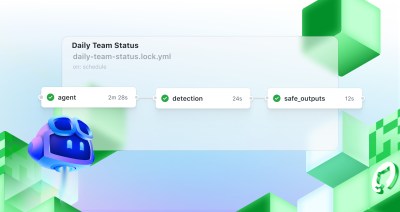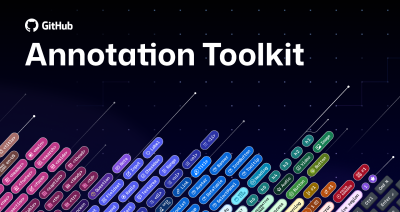Switching from Bitbucket Server and Bamboo to GitHub just got easier
Starting today, GitHub Enterprise Importer supports repository migrations from Bitbucket Server and Bitbucket Data Center, and GitHub Actions Importer offers CI/CD migrations from Bitbucket and Bamboo.

Starting from February 15, 2024, Atlassian will no longer offer technical support, security updates or vulnerability fixes for their Server products like Bitbucket Server and Bamboo Server.
Switching from these tools to GitHub Enterprise Cloud and GitHub Actions has become easier, safer, and even more seamless, with today’s launch of new migration tools.
GitHub Enterprise Importer (GEI) now supports migrations from Bitbucket Server and Bitbucket Data Center to GitHub Enterprise Cloud, and GitHub Actions Importer now allows you to move from any of Atlassian’s CI/CD products–Bitbucket, Bamboo Server, and Bamboo Data Center–to GitHub Actions.
A complex landscape
Companies across the globe rely on DevOps to fuel growth and drive innovation. However, the developer tech stack has become more complicated with countless tools that don’t always integrate easily or work together, resulting in a disjointed experience and operational overhead. And despite industry-wide investments in DevOps, developers report that the most time-consuming thing they’re doing at work besides writing code is waiting on builds and tests. Concerns regarding data security and the risks associated with coordinating workflows across numerous tools are often raised.
Navigating this intricate landscape has become increasingly challenging. Investing in the developer experience can not only result in four to five times more revenue growth, but having a single, integrated platform allows for developers to spend their time doing what they do best—building great software and making an impact.
GitHub is that single, integrated platform, used by over 100 million developers. With built-in integrations and APIs, GitHub Enterprise Cloud features enterprise-ready, scalable CI/CD deployment automation with GitHub Actions, collaboration tools, natively-embedded application security testing, and the industry’s first AI-pair programmer, GitHub Copilot.
Migrating your data has never been easier
If you’re making the move to GitHub, we know you’ll have data you want to bring with you so your team can hit the ground running. We also know that fear of migration can be a big barrier to switching, which is why we’ve worked hard to make moving quick, low cost, and painless.
GitHub Enterprise Importer is our tried and tested migration tool, used by thousands of GitHub customers to migrate more than 700,000 repositories to the GitHub platform.
Today, we’re launching support for migrations from Bitbucket Server and Bitbucket Data Center, allowing you to seamlessly bring your code, pull requests, reviews, and comments to GitHub Enterprise Cloud.
With GitHub Enterprise Importer, we were able to migrate hundreds of repos from BitBucket Server to GitHub Enterprise up to 70% faster than we could have otherwise.
To migrate a repository, all you need to do is install our extension for the GitHub CLI and then run the gh bbs2gh migrate-repo command. For more details, and to learn about our tools for planning your migration and moving large numbers of repositories, see “Migrating repositories from Bitbucket Server to GitHub Enterprise Cloud” in the GitHub Docs.
Bring your CI/CD pipelines with your data
In addition to moving your repositories to GitHub with GitHub Enterprise Importer, you can also move your CI/CD pipelines to GitHub Actions with GitHub Actions Importer—a migration tool that helps you plan, forecast, and automate your CI migrations. In addition to BitBucket and Bamboo, GitHub Actions Importer already supports migrations from Azure DevOps, CircleCI, GitLab, Jenkins, and Travis CI.
GitHub Actions Importer is especially designed to help organizations when manual migration is not feasible. For organizations with large and sophisticated infrastructure, CI migrations are often a manual and time-intensive endeavor. GitHub Actions Importer speeds up this process while minimizing cost and the potential for error. In fact, since its inception, GitHub Actions Importer has helped thousands of users evaluate and test the migration of nearly a quarter million pipelines.
GitHub Actions Importer uses a phased approach to simplify the migration process:
- Planning. In this phase, you analyze your existing CI/CD usage to build a roadmap for your migration.
- Testing. Here you conduct dry-run migrations to validate that the converted workflows function the same as existing pipelines. GitHub Actions Importer supports unlimited iterations in this step to ensure any custom behavior is accurately encapsulated in your new GitHub Actions workflows.
- Migration. In this last phase, GitHub Actions Importer generates validated workflows and opens pull requests to add them to your GitHub repository. To finalize your migration, you should plan to review these workflows and migrate those constructs that could not be migrated automatically.
To get started, head to our documentation or explore Importer Labs, our learning environment with tutorials for each supported migration path.
Get started today
With GitHub Enterprise Importer and GitHub Actions Importer’s new support for migrations from Atlassian’s DevOps tools, it’s easier than ever to switch to the GitHub platform.
Want to learn more about GitHub Enterprise? Get in touch with our sales team—we’ll be happy to help.
Tags:
Written by
Related posts

Automate repository tasks with GitHub Agentic Workflows
Discover GitHub Agentic Workflows, now in technical preview. Build automations using coding agents in GitHub Actions to handle triage, documentation, code quality, and more.

Level up design-to-code collaboration with GitHub’s open source Annotation Toolkit
Prevent accessibility issues before they reach production. The Annotation Toolkit brings clarity, compliance, and collaboration directly into your Figma workflow.

How to use the GitHub and JFrog integration for secure, traceable builds from commit to production
Connect commits to artifacts without switching tools.